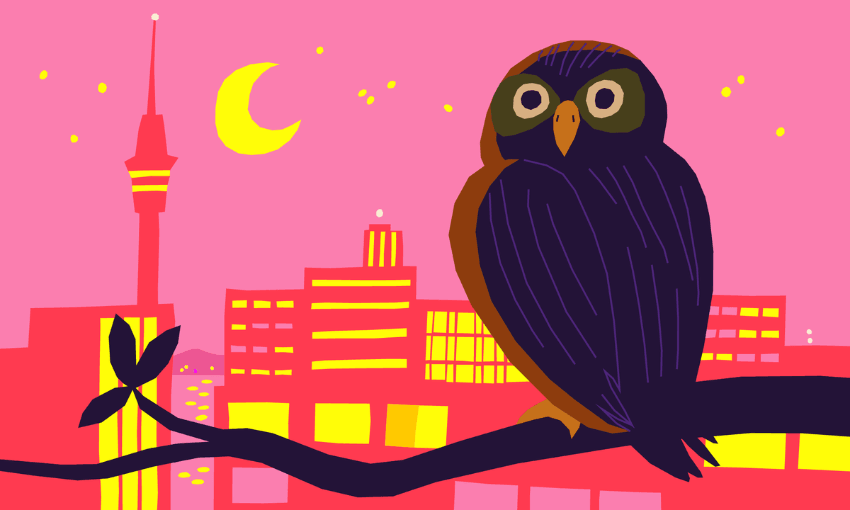All the joy that can be had – and admin that can be done – when you stay up late.
In primary school, I loved diorama assignments. A Jurassic scene complete with a volcano, a historic building made of cake – these were my Super Bowl. I could’ve worked endlessly through the night on these, tinkering with the tiny details until it was time for school. Luckily, my dad was there to give me deadlines. Or sometimes he’d just firmly say, “It’s done”.
Fast-forward 20 years and I found myself writing a book. I’d bet that 90% of the final text was written between the hours of 11pm and 3am. Everything else got edited out. The focus I can find after the sun sets, and the results I can get, are just different. On reflection, I’ve always been a night owl.
Other late night endeavours I enjoy include: making tiny tacos and other food items out of Sculpey, watching full David Tennant crime series in one sitting, YouTube yoga classes and doomscrolling through the lives of Pookie and Jett Puckett. I’m also a big fan of eating dinner quite late. I don’t generally wash up or put the dishwasher on until 9:30. When you stay up as late as I do, there’s really no rush.
Spinoff staff writer Gabi Lardies is also usually up late, either going to gigs or doing late night admin. “I try to do all my washing during the week because you know what’s really annoying? When you put washing on on a Saturday and you have to wait an hour for it to finish but you want to bugger off to the beach. It’s so good to put it on late at night, then hang it out in the morning.”
Being a night owl has actually become a bit of a game for Lardies. “I have an alarm that goes off on my phone at 9pm. That’s when my free power starts. I do all the washing, vacuuming, and put the dishwasher on then. Sometimes I even put the heated towel rail on.”
Lardies has a “time-of-use” plan from Contact Energy, which offers free electricity outside of peak demand time which is just before and after the standard workday. “I love to get my bill and see what percentage of my power I used during the free period. My record is 23%.”
Shifting power-hungry chores into off-peak hours is an easy way for night owls, who are up anyway, to save money and be more sustainable. Power used in off-peak windows is also more likely to be renewable. Around 80% of New Zealand’s electricity comes from renewable sources, but during peak demand, the supply often needs to be topped up with energy from fossil fuels.
Bec Murphy, meanwhile, is a midnight baker. After 9pm she’s often whipping up brownies, berry protein slice, Anzac biscuits or cheesy pastry swirls painted with Vegemite – yum. “Locusts [kids] come into my house during the day, so it has to be done at night and I’m busy during the day.” Murphy echoes Lardies’ sentiment on trying to get admin done on the weeknights: “I try to get all the vacuuming and washing done then because life is for living on the weekends.”
For Tina Tiller, Spinoff designer, being a night owl is about not bending to the rules. “I don’t like being told what to do. Staying up late feels like a way to take a break from the rules and the regimentation that society puts on us.”
As a night owl, Tiller “fluffs about”. The first thing she does is turn on the TV. “I’ll flick on some anime, maybe one that I’ve seen before, on low volume, for background noise. I turn on the lamp, read my book, do some stretching after a day of sitting at my desk,” she said.
Other night owl endeavours for Tiller have included: claybuilding, trying to learn to play the synth, rearranging her furniture, watching long format Magic Bullet infomercials and journaling. “I only journal late at night maybe because that’s when I’m left to digest, to think about what I’m actually thinking about.”
“Staying up so late starts to feel like you get to zoom in on your own personal microscope, it takes all the distractions away and allows you to distance yourself from your normal environment and just sit in your own self. Nothing else matters.”
The wee hours feel loose, ad hoc and free in a way highly structured day light hours just don’t. From my perspective, there’s really only one drawback to ignoring normal bedtimes: sometimes you’re horrible to be around the next day. You don’t actually have to stay up that late to take advantage of what the nighttime offers though. Free “off-peak” power from Contact on the Good Nights plan* starts at 9pm and runs till midnight Monday to Friday. And if you truly can’t hack it, you can just set your dishwasher, for example, to switch on once you’re asleep. It’s an easy way to shift chores into off-peak hours, save money and be a little more sustainable.
As Tiller puts it, “The night time is great – people might benefit from staying up a little later to feel how different the tempo is, they might like it.” Free power isn’t a bad shout either.

